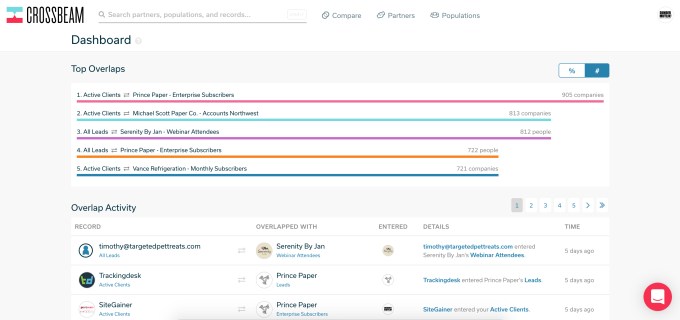Crossbeam gets $12.5M Series A to help companies organize their partnerships
When Crossbeam CEO and co-founder Bob Moore was working at previous startups, he noticed a problem around sharing information with potential partners. In fact, it was so acute he decided to create a startup to solve that problem, and today, Crossbeam announced a $12.5 million Series A round led by FirstMark Capital with participation from existing investors Uncork Capital and Slack Fund.
Moore says that in his previous jobs, he was encountering issues with getting partners integrated and answering basic questions like how many customers do we have in common or are my sales reps currently selling to any of the same people that your sales reps are selling to, and so forth.
"We eventually realized the reason these questions were hard to answer was that you can't draw a Venn diagram of all the data unless you have all of the data in both of the circles," Moore told TechCrunch. In other words, each company has only half of the picture, what they already know, and it's hard to make data-driven decisions without more information.

Crossbeam Summary Dashboard. Screenshot: Crossbeam
He added that there is danger in the age of GDPR and the upcoming California Consumer Privacy Act (CCPA) in oversharing of data, but at the other extreme is not sharing at all. Moore said he created Crossbeam to deal with this. "It seemed like the solution would be to build something that could almost function as an escrow service for data, which could sit between companies that are partnering with each other, and allow them to combine their data sets and identify that when certain conditions are met - like an overlapping need, or an overlapping customer - to take very specific precise actions as a result of that overlap," Moore explained.
The product works by sharing data from tools like Salesforce, Hubspot or even a .csv file and comparing that data inside of Crossbeam. Partners can see the overlap and where it makes sense for them to work together. Sometimes that may involve customer names, but other times it may be common sales reps across accounts. He says that many companies start with highly trusted partners to get comfortable with the product before branching out.
The company, which was founded in July 2018, has 15 employees and is based in Philadelphia. It previously received a $3.3 million seed round at the end of 2018.